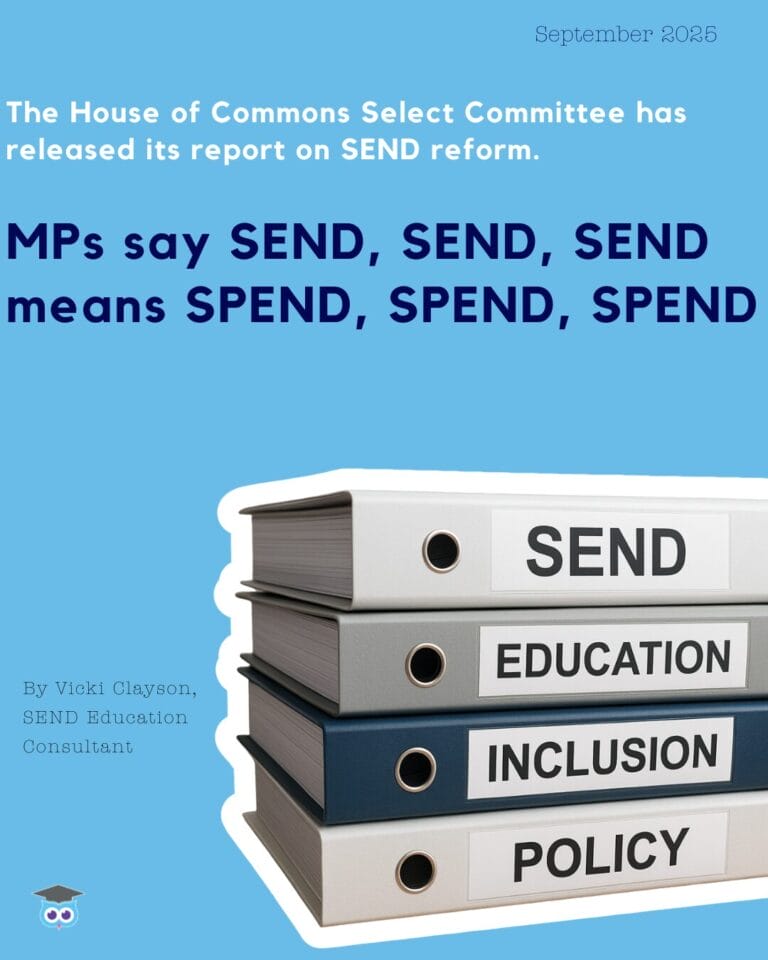
A wake-up call for government to put funding and reform at the heart of inclusive education.
The new report from the House of Commons’ Education Select Committee, published on 18 September 2025, comes nine months after being commissioned. Although there may be some omissions, overall it is a thorough and well-reasoned piece of work. The key message is clear: schools, government, and the NHS must work together so that every child can access the support they need, when they need it.
10 Key Points from the SEND Report
• Comprehensive reform is required: SEND must become an intrinsic part of mainstream education, not an add-on.
• Early identification and support: Needs must be recognised as early as possible, with classroom practice and SEN support strengthened to reduce reliance on EHC plans.
• Inclusive education must be defined: The Department for Education (DfE) should publish a clear national definition, supported by accessibility, staff expertise, flexible curricula, and accountability.
• National standards are needed for consistency: A unified framework for ordinarily available provision and SEN support must be introduced to ensure equity.
• EHC plans under pressure: Demand is unsustainable. Plans should remain legally enforceable but become less necessary if mainstream inclusion improves.
• Workforce investment is essential: Mandatory SEND training for all teachers and improved recruitment of specialists are critical.
• The funding model is outdated: The £6,000 per-pupil threshold must be uprated annually, and the National Funding Formula reviewed to reflect regional variation.
• The health sector must step up: NHS involvement is currently too passive. Integrated Care Boards need clear responsibilities and adequate resources.
• Trust and accountability: Parents should be treated as partners. Ofsted inspections must rigorously assess inclusion, and inspectors should receive specialist training.
• Life stages beyond school: Early years must be well resourced, and post-16 provision requires ringfenced funding, flexible qualifications, and accessible transport.
Key Observations
This report highlights the urgent need for standardisation. It is unacceptable that there is still no national format for EHC plan applications, leaving each local authority to develop its own system. This lack of consistency makes national comparisons difficult and often results in a postcode lottery for families. In worst cases, local authorities can take up to two years to respond to applications.
Writing off the SEND-related debts of local authorities, which amount to billions of pounds, seems a sensible step. Allowing authorities to collapse financially would be untenable. These debts are not of their own making but the result of a flawed system introduced in 2014 that has proved unfit for purpose.
The Committee is right to emphasise the importance of identifying needs in the early years. Tackling challenges at the earliest stage will inevitably require investment, but it will also reduce the scale and cost of interventions required later. The Government now faces the challenge of finding the necessary resources in the short term to deliver savings and better outcomes in the long term. Its formal response to the report is due in two months, coinciding with the November Budget.
Finally, it is welcome that the Committee does not propose abolishing EHC plans but instead it recommends reforming the system to reduce unnecessary reliance on them. EHC plans will remain essential for pupils with complex needs.
To support schools, iASEND has recently introduced an intervention tracking module to help monitor the progress of pupils with EHC plans.
Author: Vicki Clayson, SEND Leader at iTRACK Education
Email: [email protected]

